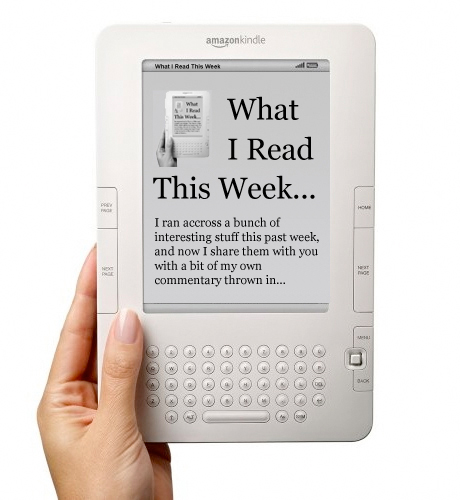
(Technically, this is what I read last week; it’s just late going out. Just sayin’) In preparation for Part 2 of this past month’s newsletter, The Future of the Web, which will be out next week, I’ve been doing a bunch of reading. These articles were among the many I had in my research, so they have some common themes:
Are We Losing Our Memory? or The Museum of Obsolete Technology
This is a pretty fascinating article detailing the plight of the
National Archives, which is rapidly running out of space, and the
ability to access much of the media storing significant pieces of our
nation’s history. The author notes that there is a strange relationship
between the shelf-life of media and it’s technical sophistication,
pointing out that simple stone tablets still survive and provide
information, whereas glass discs used by the Army during World War II
are very cumbersome to interact with. Here’s a quote that drives home
the point about the difficulty faced by archivists:
The Archives possesses some 70,000 of these foot-and-a-half military
recordings, each of which has a playing time of about two hours. It
would take a researcher who worked without interruption for eight hours
a day approximately 48 years to listen to this collection in its
entirety. “A lot of them may contain a lot of nothing, airwave noise,
shortwave whistles, but you may have to listen to the whole thing to
figure that out,” Mayn said.
Augmented Reality, Your iPhone, and You
This
is a nice collection of various demos and proofs-of-concept for
augmented reality applications. Augmented Reality is quite the hot
topic right now (I’m going to cover it in part 2 of The Future of the
Web), so I expect much more of this type of thing.
A World of Methuselahs
A detailed overview of how life expectancy averages have increased
significantly in the last century, and what our expectation should be
for continuing increase. Before the article somewhat devolves into a
primer on American healthcare policy changes, it covers some really
interesting perspectives on how we might extend lifespans, who would
benefit, and whether it would be desirable to live much longer than we
do now. A quote:
People almost everywhere could extend their life spans further just
by doing a few sensible things, such as not smoking, drinking only in
moderation, eating lots of fruit and vegetables and taking regular
exercise. Educated folk are better at keeping to such rules, and as a
group they live markedly longer than those with only basic schooling.
Richer people, unfairly, also live longer than less well-off ones, even
in the developed world.But all this is tinkering at the edges. Mankind’s dream has been to
conquer ageing altogether, and scientists are working on it. Spare-part
surgery to replace worn-out bits of the anatomy is already
well-established and will get better with the use of stem-cell
technology. For a more general effect, experiments on rodents have
shown that a severely restricted but balanced diet can increase their
lifespan by about 30%. But nobody knows whether this would work in
humans, and even if it did, there might be few takers.
The Three Hardest Words to Say
This
is the second post I’ve encountered recently where the author has been
extremely honest about something that I think causes us all a lot of
unnecessary anxiety. I admit that I say these three words far less than
I should. I’d love to see myself and others take this seriously and be
ok with being fallible humans.
Calling Bull****on Social Media
Exhilaratingly
honest and a must-read for anyone working in an “online” industry or
any social media enthusiast. Every point he makes I have though of
before, yet never had the courage to say publicly. It’s ironic that in
a time of unprecedented connection with other humans, we have such a
hard time actually *being* human. I cheered as I read.


